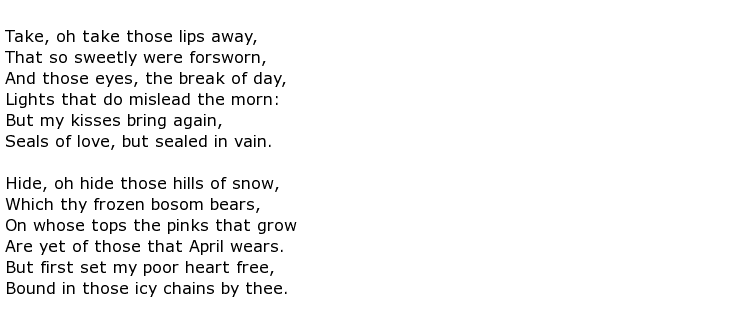 John Fletcher was a distinguished Jacobean playwright who has been credited with over fifty plays, although many of these were written in collaboration with other writers such as Philip Massinger and Francis Beaumont. His plays had a recognisable style and were often referred to as written in the “Fletcherian textual profile” or “in the Fletcher canon”. He was also a poet and, in fact, some of his plays contained verse which was later extracted as stand-alone poems. An example of this was the poem Take, Oh take Those Lips Away which first appeared in the tragic 1621 play known by two titles: The Bloody Brother or Rollo, Duke of Normandy. Fletcher was so highly regarded as a writer that he held the position of house playwright to the acting company known, during the reign of James I, as “The King’s Men”. It was said at the time of the Restoration that Fletcher’s work rivalled that of William Shakespeare.
John Fletcher was a distinguished Jacobean playwright who has been credited with over fifty plays, although many of these were written in collaboration with other writers such as Philip Massinger and Francis Beaumont. His plays had a recognisable style and were often referred to as written in the “Fletcherian textual profile” or “in the Fletcher canon”. He was also a poet and, in fact, some of his plays contained verse which was later extracted as stand-alone poems. An example of this was the poem Take, Oh take Those Lips Away which first appeared in the tragic 1621 play known by two titles: The Bloody Brother or Rollo, Duke of Normandy. Fletcher was so highly regarded as a writer that he held the position of house playwright to the acting company known, during the reign of James I, as “The King’s Men”. It was said at the time of the Restoration that Fletcher’s work rivalled that of William Shakespeare.
John Fletcher was born in the English coastal town of Rye, in the county of Sussex, in December 1579. At this time his father, Richard Fletcher, was personal chaplain to Queen Elizabeth I as well as holding a number of high profile positions such as Bishop of London. While he was Dean of Peterborough he was present at the beheading of Mary, Queen of Scots and sought to immortalise himself by praying long and loudly on the very steps of the scaffold. The young John Fletcher was sent to Corpus Christi College, Cambridge University at the age of 11. His father had ambitions for his son to follow him into the church but, instead, John headed for London to try his hand in the theatres.
His first collaborations with Beaumont began around the year 1606, both writing for the Children of the Queen”s Revels, and later for the King’s Men. It is thought that they worked together for at least ten years and in fact shared a London house “and a wench” during this time. It is also believed that he worked with Shakespeare on at least three plays: Henry VIII, The Two Noble Kinsmen, and the lost Cardenio.
It seems that collaboration on literary projects was Fletcher’s preferred way of working and further joint efforts came when he teamed up with Philip Massinger. Fletcher was most certainly a very popular playwright at court with several of his plays being performed there. His specialities were comedies of manners and tragi-comedies and it seems that most of the King”s Men”s repertoire consisted of Fletcher’s work up to the suppression of the theatres in 1642. Eighteen years passed before they were reopened but, in the meantime, small segments of plays (known as “drolls”) were performed in private locations in order to satisfy the hunger of the public for live performances.
As mentioned above, some of his lines were extracted to be used as poems and here is the quoted example, Take, Oh take Those Lips Away:

John Fletcher died in London on the 29th August 1625 at the young age of 45. It is believed that he was a victim of the plague and he was buried on the site that eventually became Southwark Cathedral.

